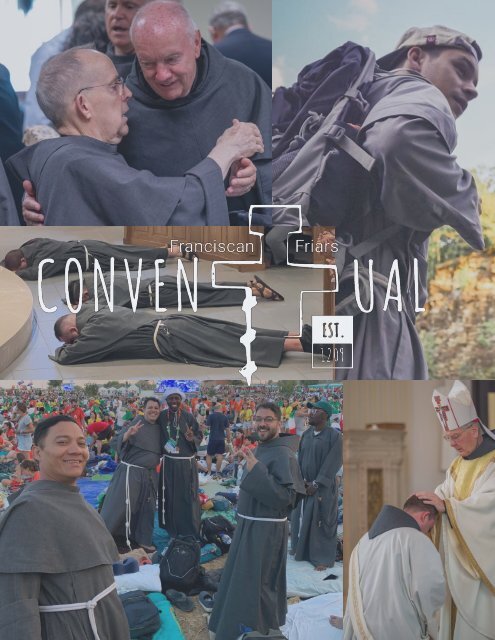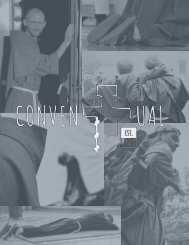Franciscan Friars Conventual Vocations
Just who are those "Conventuals," anyway? Check out our digital viewbook, to start learning about Francis, Franciscan Spirituality, the Conventual Charism, and the path to joining us as a friar!
Just who are those "Conventuals," anyway? Check out our digital viewbook, to start learning about Francis, Franciscan Spirituality, the Conventual Charism, and the path to joining us as a friar!
Create successful ePaper yourself
Turn your PDF publications into a flip-book with our unique Google optimized e-Paper software.
<strong>Franciscan</strong>Voice.org<br />
Chat w/ our<br />
Vocation Director<br />
vocations@olaprovince.org<br />
202-681-6051<br />
<strong>Franciscan</strong> <strong>Friars</strong> <strong>Conventual</strong><br />
Vocation Office<br />
1359 Monroe St. NE<br />
Washington, DC 20017
Pax et bonum! Peace and all good!<br />
If you’ve made it as far as this page, it likely<br />
means you’ve been feeling God tugging at<br />
your heart lately.<br />
This viewbook offers an introduction to the<br />
<strong>Franciscan</strong> <strong>Friars</strong> <strong>Conventual</strong>, a religious<br />
order that has been part of the life of the<br />
Roman Catholic Church for more than eight<br />
centuries. Inside, you’ll learn about Francis of<br />
Assisi, <strong>Franciscan</strong> spirituality, the <strong>Conventual</strong><br />
charism, our ministries, and the process for<br />
becoming a friar.<br />
A verse from the Divine Office calls Saint<br />
Francis a “thoroughly Catholic and apostolic<br />
man.” Francis’ legacy was his refreshingly<br />
authentic Catholicism, which manifested the<br />
joy of the Gospel. We strive to follow Christ in<br />
that model of our founder: to be refreshingly<br />
Real and thoroughly Catholic.<br />
We hope this serves as but a starting point<br />
for your deeper exploration of our<br />
brotherhood.
Saint Francis was born in the Italian town of Assisi in<br />
1181 or 1182. His father was a successful cloth<br />
merchant with big plans for his son. He was only too<br />
happy to outfit Francis with the equipment needed to<br />
become a knight.<br />
St. Francis of Assisi<br />
Francis’ military glory was short-lived; he was<br />
captured and spent a year as a prisoner of war. This<br />
sobering failure led Francis to reexamine his dreams.<br />
On a reflective walk one day, Francis stopped to pray<br />
in the crumbling chapel of St. Damian. There, he had<br />
a mystical experience of Christ speaking to him from<br />
the crucifix. “Repair my house, which you see is falling<br />
into ruins.” Francis took this literally and began to<br />
rebuild the little church. Such behavior brought his<br />
father’s anger, especially when Francis stole cloth to<br />
raise funds for the repairs. Dragged before the bishop,<br />
Francis renounced his inheritance, declared God his<br />
only father, and entrusted himself to the Church.<br />
Francis encountered much ridicule, but also started to<br />
attract other young men from the town, who<br />
recognized in Francis something they’d been lacking.<br />
They joined him in repairing churches, ministering to<br />
lepers, and preaching penance.<br />
In 1209, with more men joining Francis and his<br />
companions in their life of ongoing conversion, the<br />
group visited Pope Innocent III to ask the Holy<br />
Father’s permission for this new brotherhood. Very<br />
quickly, the <strong>Franciscan</strong> Order spread beyond Italy.<br />
Basilica of Saint Francis, Assisi, Italy
PENANCE<br />
<strong>Franciscan</strong><br />
Spirituality<br />
“Do penance, performing worthy fruits<br />
of penance, because we shall soon die.”<br />
EUCHARIST<br />
- Francis of Assisi, “The Earlier Rule”<br />
“O sublime humility! O humble<br />
sublimity! The Lord of the universe so<br />
humbles Himself that for our salvation<br />
He hides Himself under an ordinary<br />
piece of bread!”<br />
- Francis of Assisi, “Letter to the Entire Order”<br />
INCARNATION<br />
“Hold back nothing of yourselves for<br />
yourselves, that He Who gives Himself<br />
totally to you may receive You totally!”<br />
MARY<br />
- Francis of Assisi, “Letter to the Entire Order”<br />
The PASSION<br />
“But we can boast in our weaknesses<br />
and in carrying each day the holy cross<br />
of our Lord Jesus Christ”<br />
- Francis of Assisi, “Admonition V”<br />
“Holy Virgin Mary, among the women<br />
born into the world, there is no one like<br />
you: daughter and servant of the Most<br />
High, mother of Christ, spouse of the<br />
Holy Spirit.”<br />
- Francis of Assisi, “Office of the Passion”
<strong>Conventual</strong><br />
Tradition<br />
The <strong>Franciscan</strong> <strong>Friars</strong> <strong>Conventual</strong> (sometimes referred to as the “Grey <strong>Franciscan</strong>s" due<br />
to the color of our habits) is one of the three branches of the First Order of St. Francis.<br />
The word conventual comes from the Latin meaning to come together; we live together<br />
in convents, usually called friaries.<br />
Francis indicated two fundamental Gospel values as essential to the spiritual charism<br />
(the way a particular group puts faith into action) of the Order: fraternitas and<br />
minoritas.<br />
In his final Testament, Francis rejoiced in the fact that “the Lord gave me some<br />
brothers.” <strong>Franciscan</strong> spirituality gives primacy of place to the fraternal life of the friars.<br />
From the <strong>Conventual</strong> perspective, our life in fraternitas is the primary ministry we offer<br />
to the life of the Church. For most religious orders, community life is the means to an<br />
end; it makes doing ministry more practical. For <strong>Conventual</strong> <strong>Franciscan</strong>s, community<br />
life is an end and ministry in itself.
In a world fallen and fractured, the <strong>Franciscan</strong> life of<br />
conventual brotherhood—active participation in the<br />
fraternal life, liturgical prayer, shared ministry,<br />
communal decision-making, and the common table—<br />
witnesses to a radically alternative way of living<br />
amidst an increasingly divisive culture.<br />
Minoritas is a characteristic way of following the poor<br />
and humble Christ that urges friars to reject power, to<br />
be subject to all, to serve one another, to be in<br />
solidarity with the most marginalized of society, to<br />
foster peace wherever we go, and to embrace a<br />
continual process of self-emptying.<br />
The friars of our Order live out their vowed<br />
consecration by serving in the Church as both<br />
ordained priests and religious brothers.<br />
<strong>Conventual</strong><br />
Charism<br />
Fraternity<br />
as mission<br />
Fidelity to the<br />
Magisterium<br />
Service to the<br />
outcast &<br />
marginalized<br />
Emphasis on the<br />
nobility of the<br />
liturgy<br />
Care for Creation<br />
Academic<br />
development<br />
Peace-building<br />
Flexibility in<br />
ministry
Ministry as a Friar<br />
Many religious orders were founded to exercise a specific<br />
apostolate within the Church. The <strong>Franciscan</strong>s were not.<br />
Francis formed a fraternity, whose members often<br />
continued the trades they practiced before joining the<br />
community. If the work you do serves Christ and helps<br />
rebuild His Church, it’s work you can do as a friar!<br />
<strong>Friars</strong> minister as parish priests, high school teachers,<br />
school presidents, university campus ministers, professors,<br />
directors of religious education, nurses, lawyers,<br />
administrators of food pantries, social workers, counselors,<br />
retreat house directors, hospital and fire chaplains, EMTs,<br />
media specialists, scholars, and even bishops!
Postulancy<br />
WHAT IS IT? An immersion<br />
experience, living & learning<br />
the friar lifestyle<br />
HOW LONG? 1 year<br />
WHERE? Chicago<br />
Profession of Solemn Vows &<br />
Lifelong Commitment<br />
Ordination<br />
Post-Novitiate<br />
WHAT IS IT? Studies* and<br />
training for ministry as a<br />
priest or brother<br />
HOW LONG? 3 - 7 years<br />
WHERE? Washington, DC or<br />
San Antonio, TX<br />
Reception of the Habit<br />
Novitiate<br />
WHAT IS IT? An intense,<br />
retreat-style, deep-dive into<br />
your <strong>Franciscan</strong> vocation<br />
HOW LONG? A year and<br />
a day<br />
WHERE? Arroyo Grande, CA<br />
First Profession of Vows<br />
The Formation Journey<br />
*Priesthood Pathway<br />
*Brotherhood Pathway<br />
Undergraduate degree<br />
Graduate study or<br />
professional training for<br />
chosen field of ministry<br />
Ministry Experience (1 year)<br />
Undergraduate degree<br />
Pre-Theology (2 years)<br />
30 credits Philosophy<br />
12 credits Theology<br />
6 additional credits<br />
(usually language)<br />
Graduate Theology (4 years)<br />
Ministry Experience (1 year)<br />
Diaconate Experience (6 months)
The Path Ahead…<br />
Apply.<br />
When you—in dialogue with the<br />
vocation director—feel you’re ready<br />
to take the risk of following the<br />
Lord’s call, you’ll go through an<br />
application process. Basically, it’s<br />
a lot of paperwork.<br />
Arrange a visit<br />
to one or more of our friaries. You wouldn’t<br />
discern marriage without dating, so how<br />
can you discern religious life without<br />
getting to know a community?<br />
Email our Vocation Director,<br />
who is happy to offer guidance and<br />
companionship along your discernment<br />
journey.<br />
Get a Spiritual Director.<br />
Don’t have the first clue how to go<br />
about finding one? Your parish priest or<br />
a vocation director can help.<br />
Pray.<br />
You can’t discern how God is<br />
working in your life without talking<br />
with Him about it.




